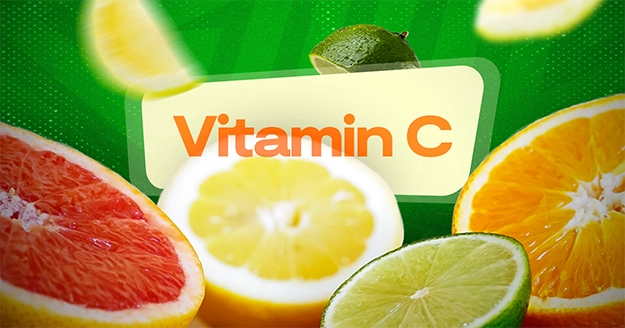Every time we bite into that delicious juicy orange, we probably aren’t thinking of all of the benefits we can get from that piece of fruit— and if we are, we might be thinking of a certain vitamin.
Vitamin C, also known as L-ascorbic acid, is a water-soluble vitamin. This indicates that it is delivered to the body’s tissues after dissolving in water, but it is not well stored, necessitating daily ingestion of food or supplements.
This vitamin exists naturally in some foods, added to others, and is available as a dietary supplement. Humans cannot make vitamin C endogenously, so it is an essential dietary component.
In this article, we’ll find out some of the benefits of vitamin C as well as answer questions such as, “How does vitamin C reduce oxidative stress and muscle damage during exercise?”
Vitamin C, Oxidative Stress, and Muscle Damage
An imbalance between the ROS or reactive oxygen species production and accumulation in cells and tissues causes oxidative stress. It occurs when the cells in a person’s body have excess free radicals. Oxidative stress can damage your cells’ components such as proteins and DNA, which can contribute to aging.
How does vitamin C reduce oxidative stress?
Any situation in which oxygen consumption is increased, as during physical exercise, could result in an acute state of oxidative stress. Intense and prolonged exercise can result in oxidative damage to both proteins and lipids in the contracting myocytes. This can cause excessive muscle damage.
It can be good to take vitamin C for oxidative stress. Since vitamin C is an antioxidant, it prevents oxidative stress-related cellular damage by scavenging reactive oxygen species (ROS), and shielding proteins from the alkylation of electrophilic lipid peroxidation products.
Additionally, vitamin C helps in the production of collagen, the abundant protein that strengthens your skin, tendons, and muscles. This helps your body heal damaged tissue, which is crucial for faster recovery after exercise.
Aside from discussing the relationship between vitamin C, oxidative stress and muscle damage during exercise, let’s talk about the general benefits of vitamin C.
Vitamin C Benefits
Fights Free Radicals
Free radical exposure comes from chemicals, pollution, and UV light. Vitamin C protects the skin from these, which are linked to accelerated aging.
Lowers Heart Disease Risk
Some studies show that vitamin C can slow down the progression of atherosclerosis (hardening of the arteries). It also helps prevent damage from LDL (“bad”) cholesterol, which can build up as plaque in your arteries and cause stroke or heart attack.
Prevents Iron-Deficiency Anemia
Iron is required for the production of hemoglobin during the process of creating blood. The purpose of hemoglobin is to bind and transport oxygen to the cells.
According to various research findings, iron supplementation with vitamin C will result in improved iron absorption. In conclusion, vitamin C facilitates iron absorption by converting iron from ferric to ferrous, which makes it easier for the body to absorb.
Boosts Immunity
Vitamin C supports various cellular processes of your body’s adaptive immune systems, helping your immune defense system.
Speeds Healing
There is proof that vitamin C promotes dermal fibroblast proliferation in addition to its role in collagen synthesis, which is crucial for wound healing.
Fights the Common Cold
While taking vitamin C supplements won’t lower your chance of getting a cold, they could speed up your recovery and lessen the severity of your symptoms.
Symptoms of Vitamin C Deficiency
You can notice that you generally feel unwell, have nausea, and have a lack of appetite if your vitamin C levels are low. Some individuals with vitamin C deficiencies have reported flu-like symptoms. Since iron absorption relies on vitamin C, low iron levels may contribute to this.
A tendency to bruise or bleed readily and dry skin and hair are indicators of vitamin C insufficiency.
How much vitamin C do adults need to stay healthy?
Dosage: The recommended Dietary Allowance (RDA) for vitamin C is 90 milligrams (mg) daily for adult men and 75 mg for adult women. The maximum dosage of Vit C that you can take in a day that most probably won’t cause harm ( tolerable upper intake level) for adults is 2000 mg per day.
Can you get enough vitamin C through food alone?
You can get your daily vitamin C by eating a variety of foods. Good Sources of Vitamin C:
- Cantaloupe, 1 cup (8 ounces): 59mg
- Orange juice, 1 cup: 97mg
- Broccoli, cooked, 1 cup: 74mg
- Red cabbage, 1/2 cup: 40mg
- Green pepper, 1/2 cup, 60mg
- Red pepper, 1/2 cup, 95mg
- Kiwi, 1 medium: 70mg
- Tomato juice, 1 cup: 45mg
Vitamin C is good but be careful not to overdo it.
Side effects of consuming too much Vitamin C include the following:
- Diarrhea
- Nausea
- Vomiting
- Heartburn
- Stomach (abdominal) cramps
- Headache
Conclusion
Keep in mind that most people get adequate vitamin C from a healthy diet. It is an essential micronutrient that fights against oxidative stress and muscle damage, among other benefits. But ensure that you keep within your daily recommended intake to avoid unnecessary side effects.










